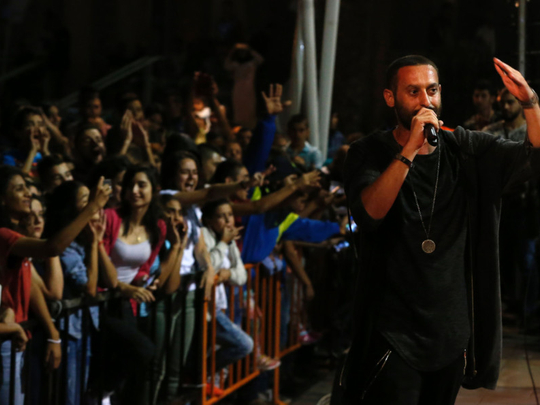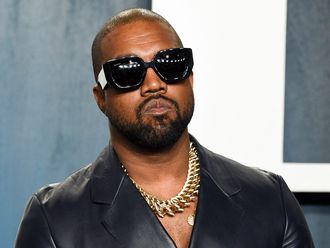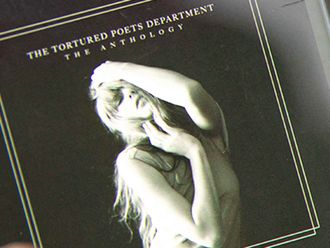
Palestinian rapper Tamer Nafar’s politically charged lyrics have sparked the same kind of controversy that may have made his hero Tupac Shakur proud.
Nafar, from the pioneering political rap group DAM, has touched a nerve with songs like Who’s the Terrorist? skewering what he and others say is discrimination against Palestinians living in 1948 areas.
He has become a star among Palestinians and the left-wing Jewish cultural elite, but Israeli Culture Minister Miri Regev, a former military censor with a combative style, is not a fan.
She has singled him out for criticism, accused him of incitement and sought to have one of his recent performances cancelled, helping make him a target of right-wing protesters.
In a recent interview, the 37-year-old, who wears a hoody, baggy pants and simple gold chain, dismissed her remarks, saying: “Regev is nothing but a government mouthpiece spreading racist poison.”
Speaking after a concert in the city of Sakhnin attended by about 1,000 people, many of them teenagers, he pledged to continue with his strident lyrics matched with infective beats.
1948 Palestinians, like Nafar, come from families who stayed on their land when Israel was created in 1948, and they currently make up around 18 per cent of the country’s population and hold Israeli citizenship.
Growing up in the 1990s in Lod, a city southeast of Tel Aviv, Nafar listened to Tupac, the influential American hip-hop star murdered in 1996.
Nafar said he saw similarities between the African-American struggle for equality and the experience of Palestinians living in 1948 areas.
They say they are treated like second-class citizens and they are not afforded the same rights as their Jewish co-nationalists.
“The imagery in Shakur’s videos was similar to our reality in Lod — how the police were chasing them in the streets,” he said.
“I found out we had something in common. I didn’t speak English and I used to search for the lyrics in English, print them and sit in school with a dictionary translating them.”
DAM — an acronym for Da Arabian MCs, which also means “blood” in Arabic — performs songs that are explicitly political.
In his song Who’s the Terrorist? Nafar says: “They call me a terrorist but I live in the country of my ancestors.”
“Democracy? Why? It reminds me of the Nazis. You’ve raped the Arab soul, and it became pregnant, giving birth to a child called ‘terror attack’. And then you call us terrorists.”
The controversy peaked last month when Nafar was to perform at a government-funded festival in the northern port city of Haifa.
Regev called on Haifa’s mayor to withdraw his invitation. Despite the pressure, the gig went ahead, although the atmosphere was charged with right-wing activists wrapped in Israeli flags blocked by police from approaching the stage.
Nafar said he was “scared” by dozens of protesters outside.
“They were yelling ‘terrorist’, ‘go to Gaza’ and ‘son of a [expletive].’”
“It is not normal to go to a concert surrounded by 15 security guards for my own protection,” he added.
“There is Tamer the artist who gets on stage and raps, challenging right-wingers and fascists, but there is also Tamer the father and husband who loves his wife and children and worries about himself and them, and takes fascist threats seriously.”
He says he has both Palestinian and Jewish friends who helped him through the concert.
A spokeswoman for the Haifa municipality said the event reflected the city’s diverse culture.
Nafar is not the only artist or entertainer to be targeted by Israel’s culture minister in recent months.
Regev, who belongs to what is seen as Israel’s most right-wing government, has taken on Israel’s largely left-wing Jewish cultural elite.
They have accused her of seeking to muzzle them, including by promoting a bill to cut subsidies to cultural institutions deemed not “loyal” to the state.
She was booed on arrival at a recent cultural conference.
In September, she walked out of a film award ceremony as Nafar and a Jewish performer read out a poem by Mahmoud Darwish, considered the Palestinian national poet.
“Everything I have done came from the reality in the streets of Lod, from that ghetto,” Nafar said of the part of the city where he grew up.
“My job is to document my generation and I am not ashamed of using some Hebrew words in my songs.”
He recently finished a film, Junction 48, which he co-wrote and starred in under direction by Israeli-American Udi Aloni.
It tells the story of a Palestinian rapper, his lover and their feelings of desolation living in 1948 areas.
The film was to have been shown earlier this month at a youth club in the northern city of Karmiel, but the screening was cancelled by the local municipality.













